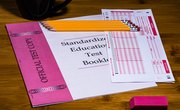NCLEX-PN is short for National Council Licensure Examination-Practical Nursing. It is the only test in the United States used to measure the competency and career-readiness of nurses. The test is taken on a computer, and consists of 85 to 205 questions. The questions you receive will depend on your answers: answering correctly will result in harder questions, while incorrect answers will result in easier ones. The test will continue until the computer decides you have shown your proficiency in the required topics, you've reached the maximum examination time of five hours or you run out of fresh questions. Due to the complicated nature of the test, its standards and the statistical elements used to evaluate a candidate's score, it is nearly impossible to accurately calculate whether you've passed the exam or not. There are some guidelines that will give you a rough idea whether you've passed or failed.
Take Timed Standardized Exam
Answer at least the minimum number of questions. The NCLEX-PN has anywhere between 85 and 205 available questions. If you do not answer at least 85 questions in the five hours allotted, you will automatically fail the exam. There is no connection between the number of questions you answer and your chances of passing or failing. Do not attempt to cheat during your exam. Evidence of cheating will lead to your scores being thrown out. You could also face further action, or be banned from taking the NCLEX-PN in the future.
Reach Competency Level
Show a competency of at least 95 percent on the questions presented. This is difficult for you to judge, because the computer bases your competency on a set of standards built around a complex statistical algorithm. If the computer tells you that you have completed the test before you reach the maximum number of questions, it is a good indication you have reached the required competency level.
Passing Standards
Understand the standards of the test. These standards are determined by the National Council of State Boards of Nursing (NCSBN), and are reevaluated every three years. Passing standards are set at -.21 logits through March 31, 2020. A logit is a is unit of measurement in statistics. For the purposes of the NCLEX-PN, the logit is the deviation from a test-taker's abilities (her answers on the exam) to her potential (the difficulty of the questions). Because of this complex formula, and the fact that you can't know whether you answered a question correctly until your results are released, it is impossible to estimate whether you've met the computer's competency standards.
Statistical Computation of Scores
Do not try to estimate your scores at home. Because the test is based on statistics and algorithms, and not a 0 to 100 percent grading scale, you will only frustrate yourself. Scores are mailed out roughly four weeks after the examination date.
Accuracy of Exam
Have confidence that your test was accurately assessed. In addition to the computer itself, the NCSBN's testing service verifies your results. The testing service is comprised of members of the NCSBN who have previously passed the exam, as well as statisticians and test writers. This is the same group that helps to develop the test questions and scoring standards, so they are very well versed in the test, its formats and the competency standards. This process of second-checking every test eliminates computer error and protects the integrity of the NCLEX-PN.
Related Articles
References
Tips
- The NCSBN most recently updated its criteria for the NCLEX-PN at the end of 2007, with the standards taking effect in early 2008. That means the standards will be up for revision once again in late 2010 to early 2011.
- The NCSBN estimates only 86 percent of first-time test-takers pass the NCLEX-PN. If you fail on your first attempt, you may retake the examination a minimum of 45 to 90 days after your first exam.
Warnings
- Do not attempt to cheat during your exam. Evidence of cheating will lead to your scores being thrown out. You could also face further action, or be banned from taking the NCLEX-PN in the future.
Writer Bio
Elizabeth Falwell has been writing for the TV news industry since 2005. Her work has appeared on WXII 12 News, WMGT 41 News, NewParent.com and multiple parenting blogs. A graduate of the S.I. Newhouse School at Syracuse University, Falwell holds a Master of Science in broadcast journalism.










